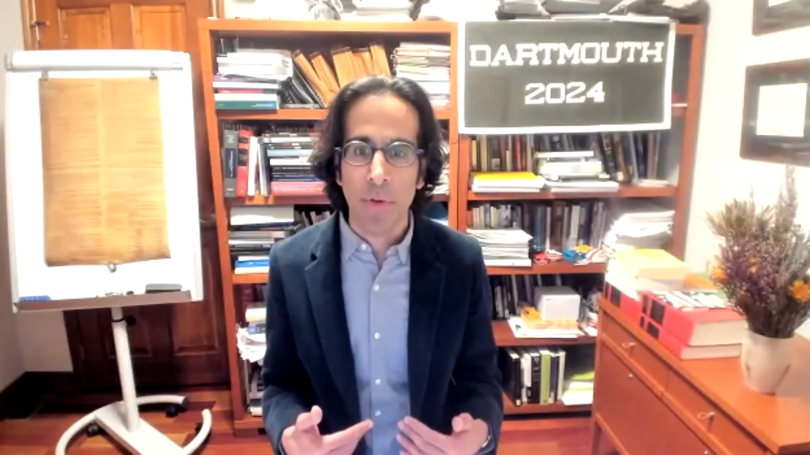
- Public Policy
- Leadership
- Funding
- News & Events
- About the Center
Back to Top Nav
Back to Top Nav
Back to Top Nav
Back to Top Nav
On Monday, January 25, 2021 Kimberly Juanita Brown, an Associate Professor in the English and Creative Writing Department; Matthew Delmont, the Sherman Fairchild Distinguished Professor of History; Deborah Karyn King, an Associate Professor of Sociology; and Eng-Beng Lim, an Associate Professor of Women’s Gender, and Sexuality Studies convened with Dartmouth students and community members at the Rockefeller Center’s fourth Rocky Watch event of the term. Rocky Watch is a weekly series of live broadcasts that create a virtual common space for community learning, discussion, and engagement in this time of remote learning.
During the lecture, the panelists discussed their research interests, their methodologies for understanding race in their research, and other topics. The event was moderated by Sonu Bedi, the Joel Parker 1811 Professor in Law and Political Science and the Hans ’80 and Kate Morris Director of the Ethics Institute.
Professor Brown studies the black diaspora and ability of photography to impact racial biases. She is passionate about “telling the story of the transatlantic slave trade as contemporary artists and writers [have] envisioned it.”
Currently, Brown is studying photographs of black individuals in news media to draw lessons about their status in society. Unfortunately, “black people are the default register for dead bodies… on the covers of national newspapers… [such as] The New York Times.” For example, in the 1990s “the vast majority of the images of extreme violence and death [were] from Haiti.” In contrast, “it is highly uncommon for someone to walk by a newspaper stand… and see a white person photographed dead.” Brown’s study raises questions about what groups of people are considered “disposable.”
With that in mind, in the classroom Brown frequently uses literature as a substitute for violent or graphic images of people of color. “I actually found that working with literature offsets a lot of the violent imagery,” Brown says.
Finally, Brown advises that students continue to learn about race and class issues outside of the classroom. “This is an ongoing process,” Brown says.
Professor Lim studies queerness and feminism, as well as race migration and sexuality. Lim thinks about race at the intersection of his other areas of academic interest, including “Asian and Asian American studies” and “postcolonial and diaspora studies,” and “performance studies.” In Lim’s words, “queer studies and cultural studies have very promiscuous methodologies.”
In that vein, Professor Lim believes that “we need to complicate discourses” in order to break free from “hetero-orientalist frameworks.” In particular, Lim believes that “the question of queerness” complicates these dynamics and sheds new light on postcolonial studies – achieving this. Lim encourages students from the sciences and the social sciences to take courses in the critical studies departments to engage with difficult questions and conversations on race.
Professor King’s research interests span topics ranging from “black womanhood” to “deviance and social control” to “Dartmouth and slavery.” Professor King is interested in the use of race to talk about racial bias and racial prejudice, as well as the ways in which race can form into a social structure. King’s questioning of identity—stemming from her musing whether she identified more strongly with being a woman or with being black—led her to pioneer the concept of intersectionality 30 years ago, in her often-cited article, “Multiple Jeopardy, Multiple Consciousness: The Context of a Black Feminist Ideology.”
Professor King doesn’t view intersectionality as an “either or approach.” Rather, the approach is based on the questions that she is asking and the kind of evidence that she has. “In some cases, [the answer] will overwhelmingly be race, but at other times class may be more salient for answering the kinds of questions that I’m posing,” King emphasizes.
Regarding her teaching, King describes the “challenge of having some students who have thought carefully… about issues of race... and then [some who are] just beginning to explore it in an academic setting.” In such an environment, King strives to “encourage debate while also ensuring respect.”
Finally, Professor Delmont is interested in “modern African American history” and is on an academic fellowship to finish a new book on the topic. In studying race, Delmont thinks critically about “what we count as evidence” because so much of the information from the periods he studies comes from white sources. When doing research, he recognizes “how deeply entrenched racism was” and strives to read between the lines to understand the experiences and contributions of people of color.
When teaching and conducting research, Professor Delmont explains that he tries to remember that while “we have to speak to a certain audience to be legible and to get tenure,” “there are different ways of sharing research” with a wider audience. Additionally, as an educator Delmont is very invested in “letting students understand that they can do this work” and encourages them to engage in evidence-based argumentation.
The Rockefeller Center thanks these distinguished professors for participating in Monday’s panel. Students can learn more about them through the Registrar or in the classroom.
-- Written by Ben Vagle ’22, Rockefeller Center Student Assistant for Public Programs
Rocky Talk Podcast w/ Sonu Bedi: Apple Podcasts and Spotify.